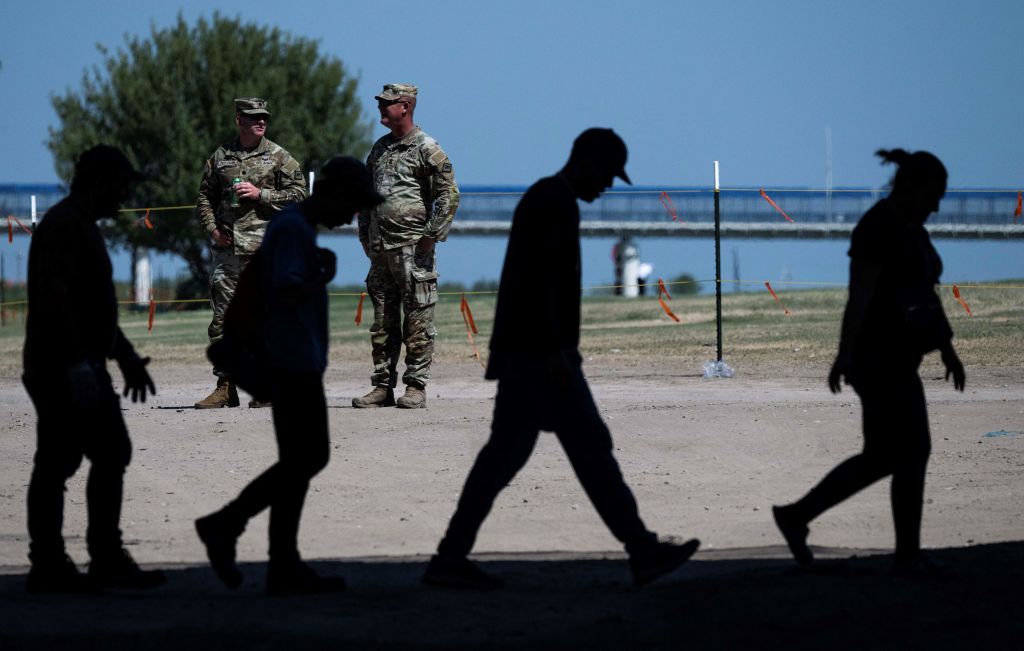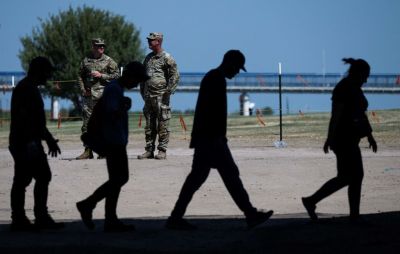In a second Donald Trump presidency, his staff’s planned crackdown on illegal immigration not only envisages mass detention of those allegedly “poisoning the blood” of America, but also resurrects a bad idea rejected at the outset of his first term: deputizing the National Guard for internal immigration enforcement. This is part of a longstanding effort by Trump officials, most of whom lack uniformed experience, to drag the military into domestic law enforcement and politics. It is profoundly unwise, and among the grave dangers presented by a Trump restoration.
In January 2017, Trump’s White House staff proposed using existing federal law to deputize state and local law enforcement to also exercise immigration enforcement powers, including conducting warrantless searches, interrogations and arrests of suspected illegal aliens. Another federal statute, known as “Section 287(g) authority,” can also reasonably be read for this power to extend to the National Guard, which through state governors maintains law enforcement powers denied to uniformed federal servicemembers.
A memorandum sent by the White House for DHS Secretary John Kelly’s signature proposed authorizing the National Guard, including from non-border states, and even loosely organized and politically appointed militias from those states, to perform the functions of immigration agents. At the time, I was (briefly) the only Republican appointee in DHS’ Office of General Counsel. This draft memo was so ill-advised that I asked for it not to be forwarded to the secretary; rather I immediately briefed him about its existence. Kelly, a retired Marine Corps general, did not need to respond verbally: He just emphatically shook his head “no.” Someone else promptly leaked the memo’s existence; the White House denied its provenance.
Reasons to reject this idea are obvious to anyone with military experience. The National Guard is a critical part of the Department of Defense; it provides wartime strategic reserves, as in Afghanistan and Iraq. The Guard further provides governors with organized manpower to respond to natural disasters and domestic unrest. Some units do riot control training, and can be given authority by governors to detain looters for example, but guardsmen are emphatically not criminal investigators.
Scenarios in which 18-year-olds with rifles but no law enforcement training are conducting searches, interrogations, and arrests of suspected illegal immigrants—and in the case of out-of-state guardsmen, in communities with which they lack familiarity—would undoubtedly end in civil rights abuses of Hispanics (immigrants and citizens alike). Police officers and federal agents receive extensive training in the Fourth, Fifth, and Sixth Amendment rights of criminal suspects, including the very limited lawful use of lethal force against Americans; soldiers do not.
The entire point of state and local police assigned as federal task force officers is the benefit of their streetwise local knowledge, compared to out-of-town federal agents. For example, a New York Police Department detective serving as a task force officer (TFO), who came up through uniformed NYPD patrol, would intuit that a Puerto Rican is a U.S. citizen and a Dominican’s family may already have been in the city for generations, whereas a Central American newcomer may indeed lack legal status. A guard member from another state would lack any such fingertip feel.
Beyond social turmoil, an individual young guard member’s predictable, good-faith mistakes while assigned to a mission for which they lack proper training, would inevitably lead to their investigation and possible prosecution by elected district attorneys who disagree with Trump administration policy. This is exactly what happened when a young Marine shot a shepherd boy in Texas on a poorly conceived counter-narcotics mission in 1997.
Unfortunately, such abuses may have been Trump’s intent. Before the 2018 midterm elections the president mused aloud about the possibility of the military shooting migrants, many of them mothers with children, attempting to cross the border. Of course, Secretary of Defense James Mattis would have never permitted that and allowed only military logistical assistance to beleaguered Border Patrol officers. As Kelly reminded Trump whenever the president suggested issuing illegal or immoral orders, American troops—from generals to privates—will not follow such orders, because they are good and decent people who do the right thing, as they are taught from day one in their initial entry training.
The midterms did not mark Trump’s last attempt to misuse the military inside the U.S. for political reasons. In 2020, Trump sought to invoke the Insurrection Act to use 82nd Airborne Division units against demonstrators in Washington, D.C., during disturbances after the murder of George Floyd; Defense Secretary Mark Esper refused. Indictments reveal that conspirators’ January 6, 2021, plans included using the Insurrection Act against those whom they anticipated would protest any refusal by Vice President Mike Pence to certify Joe Biden’s victory. Trump’s team has hinted that they plan to recall retired generals to active duty to prosecute them for their criticisms of the former president, which would enmesh the military in partisan politics. Indeed, Trump has suggested that former Joint Chiefs of Staff Chairman Mark Milley deserves to be executed, presumably as one of the “vermin” the former president calls to be rooted out.
None of this is to say the military has no role to play in some national emergencies—it certainly does. The Pentagon supported civil authorities during the coronavirus pandemic, Hurricane Katrina and the Los Angeles riots in 1992; it flew combat air patrols over U.S. cities after 9/11, and mounts missile defenses today; and it backed federal lawmen enforcing the court-ordered desegregation of Little Rock’s Central High School in 1957 and the University of Alabama in 1963. Disasters such as a large earthquake near a major city, or the use of a weapon of mass destruction in this country, would require a whole-of-government response necessarily including significant military components. But what Trump suggests is something far different, and indeed sinister, in nature.
President Joe Biden’s laissez faire immigration policies have sadly failed. Young families fleeing communism, disease, poverty, and violence abroad deserve our deep sympathy today. The United States generously welcomed my family when they fled from famine and religious persecution as Catholics in Ireland, and offered us limitless opportunities. As such I hope America will take in and embrace as many asylees and refugees as possible, every year. But we cannot take in everyone, and surely not all at once.
Once the current administration foolishly indicated that for domestic political reasons, immigration laws would only be enforced in the breach, millions of economic migrants overwhelmed first southwest border communities and then self-proclaimed sanctuary cities inland. For example, Customs and Border Patrol enforcement actions surged from 646,822 in fiscal year 2020 to 3,201,144 in fiscal 2023, and CBP encounters with aliens on terrorist screening databases soared from just three in fiscal 2020 to 172 in fiscal 2023. And those represent only the migrants encountered by CBP.
Resultant crime, and a general sense of disorder and lawlessness, now understandably jeopardize his reelection prospects. Left-wing calls to “abolish ICE” were always unserious: Every sovereign country has mechanisms to expel those unlawfully present and committing other crimes, especially those of a sexual and/or violent nature.
Plainly, far more federal law enforcement patrol, investigative, prosecutive and adjudicative resources need to go toward border security and internal immigration enforcement. So hire, train, resource, and back them. But the proposed misuse of Section 287(g) regarding the National Guard in a second Trump term is a cure worse than the disease of illegal immigration. The proposal cannot now be separated from Trump’s fascist, racist rhetoric about poisoned blood and vermin. Hispanics constitute one-fifth of American citizens and are slightly overrepresented in the military, which thankfully remains for now one of the few national institutions widely respected across party lines.
It took about a quarter century for the military to overcome the unfair derision it suffered during the Vietnam War; GIs were reluctantly embraced again during the Gulf War, and more fully only after 9/11. Using untrained guardsmen for an important and sensitive job properly assigned to ICE agents will tear apart communities, and possibly the military itself, while alienating half of the country from the armed forces. Perhaps, given the draft-dodging former president’s vocal disdain for servicemembers, that is his point.






Please note that we at The Dispatch hold ourselves, our work, and our commenters to a higher standard than other places on the internet. We welcome comments that foster genuine debate or discussion—including comments critical of us or our work—but responses that include ad hominem attacks on fellow Dispatch members or are intended to stoke fear and anger may be moderated.
With your membership, you only have the ability to comment on The Morning Dispatch articles. Consider upgrading to join the conversation everywhere.